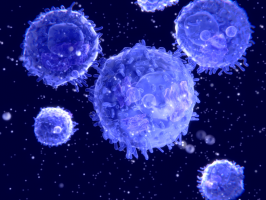
A new study will enable clinicians to identify patients with aggressive leukaemia who will not respond to chemotherapy and those who are most likely to benefit from a new immunotherapy.
The international research – led by Nottingham Trent University – has involved developing a greater understanding of how the immune system responds in patients with acute myeloid leukaemia.
It is hoped that the findings will pave the way for new and more personalised therapies for patients, as well as ensuring they get the right treatment as quickly as possible and without the use of chemotherapy, which is still the standard of care for most individuals with cancer.
Acute myeloid leukaemia progresses quickly, aggressively and requires immediate treatment – it is very resistant to chemotherapy, has a high relapse rate and just one in five patients survive beyond five years of their diagnosis.
The ability to predict the groups of patients and the types of cancer that will respond to immune targeting, an approach that harnesses the body’s own immune system to fight cancer, remains limited.
For those that don’t respond well to chemotherapy there is a survival rate of just four months and there is currently no treatment for this group.
As part of the study the researchers analysed the immunological structure of bone marrow samples of hundreds of adults and children with AML using innovative technological approaches.
This allowed them to unravel critical differences in immune genes across different disease stages and age groups.
The work involved creating a compendium of significant AML genes and proteins to provide new insight into the interactions between patients’ immune systems and cancer cells.
This makes it possible to understand how treatment can be tailored to specific patient groups.
The approach led to the identification of immune biomarkers that were able to predict patients who are resistant to chemotherapy and those likely to benefit from flotetuzumab, a new immunotherapy which is currently being developed.
This class of drugs, called “bispecifics”, have a similar structure to that of an antibody, and reinvigorate T cells, a subset of immune cells that are normally implicated in the defence against invading microbes and tumour cells and that do not work properly in patients with cancer.
Flotetuzumab is designed to bring T cells in close proximity to the tumour cells and promotes their killing.
“Acute myeloid leukaemia is an area of unmet clinical need,” said Sergio Rutella, Professor of Cancer Immunotherapy in Nottingham Trent University’s John van Geest Cancer Research Centre.
He said: “Patient outcomes are unsatisfactory, with chemotherapy resistance and disease recurrence being very common. Our work has characterised the ‘immune ecosystem’ of AML at unprecedented depth and identified immune gene signatures in the tumour that reflect immune status and predict anti-leukaemia immune potential.
“This has transformed our understanding of how treatment should be tailored to specific patients, particularly those resistant to chemotherapy and who are very challenging to treat but could show meaningful responses to second-line immunotherapy with flotetuzumab.
“Being able to predict patient responses will be crucial to tailoring drugs to individuals that are most likely to benefit.”
The study – published by the American Association for the Advancement of Science journal, Science Translational Medicine – included clinical haematologists, pathologists, clinical trialists and tumour immunologists.
Source: Nottingham Trent University
We are an independent charity and are not backed by a large company or society. We raise every penny ourselves to improve the standards of cancer care through education. You can help us continue our work to address inequalities in cancer care by making a donation.
Any donation, however small, contributes directly towards the costs of creating and sharing free oncology education.
Together we can get better outcomes for patients by tackling global inequalities in access to the results of cancer research.
Thank you for your support.